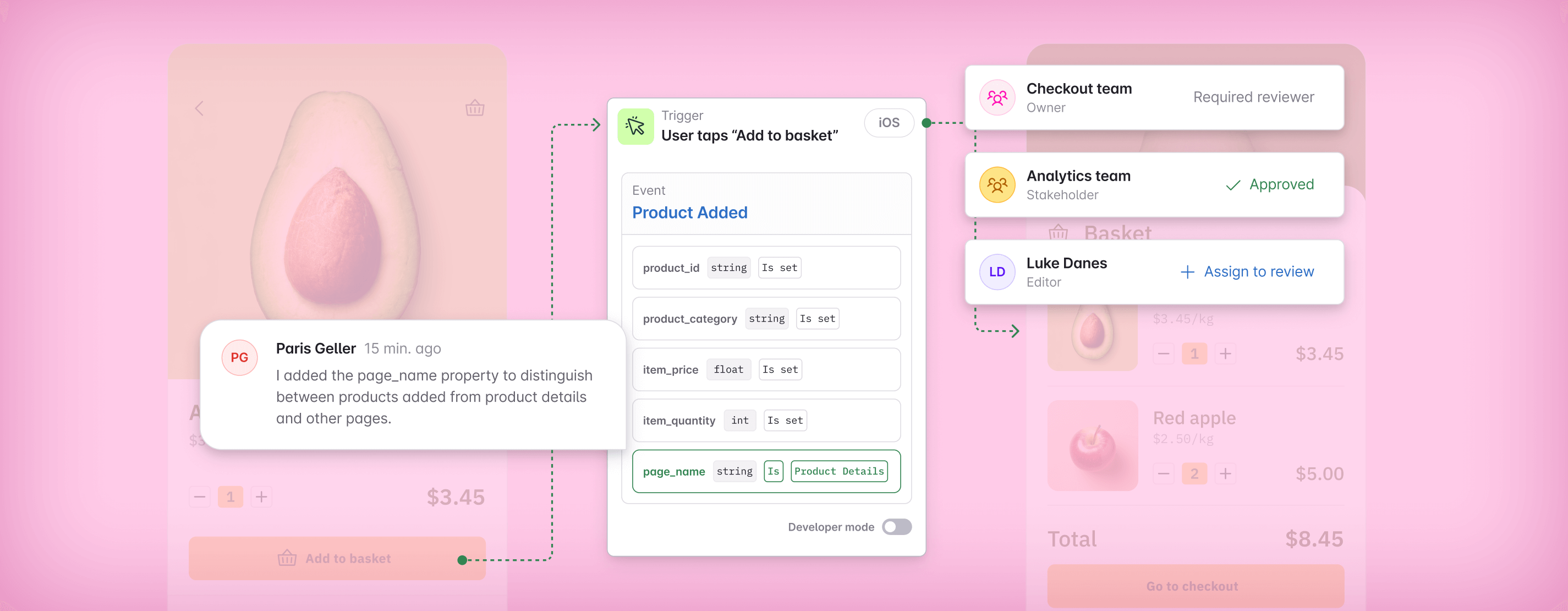In this article

New in Avo: Event-specific rules that won’t break the tracking plan
New ways to tailor your properties to certain events and scenarios
Collaboration within the tracking plan is where the magic happens. But sometimes you don’t want to pull in others for a review, or make changes that impact your whole schema. In certain cases, you might want to tweak the tracking plan with minimal disruption—perhaps to an event that only you and a small team are focused on.
Our latest update will empower you to make small, event-specific changes that increase accuracy while limiting scope. On that note, we’re excited to introduce two new ways to bring precision to your tracking plan:
➡️ Event-specific property constraints: Tailor your property values to a certain event to limit schema changes to your specific scenario.
➡️ Regex (regular expression) for property values: Enforce specific rules to your string properties to ensure consistency (great for validating values such as phone numbers, email addresses, and dates).
Set property rules that only affect the events you care about
Sometimes a small change can make a big impact on your Avo tracking plan. In some organizations, updating a rule to the value of a property that’s attached to several events could be disruptive. Especially when such events are sent across multiple sources and owned by different teams. Ideally, you’d be able to tweak properties in a way that only impacts the events you’re working on.
Our latest update is making this possible through event-specific property values. From now on, you’re able to tweak your domain-specific events without needing buy-in from everyone on the team. Internally we’ve talked about this being the data design equivalent of “striking a match without setting a forest fire”.
Imagine you’re a member of the security team for a web app, and you want to see how many people view the “Audit Log” page within the product. You create the new event “Audit Log Viewed” and you attach the property “Referred From” so you can specify the surfaces from which the Audit Log can be accessed.
Up till now, you would have to go to the property view, update the allowed values to the “Referred From” property and hope it doesn’t affect several events across multiple sources.
Today you can simply open the event and edit the property value rules according to your needs.

At the event level, select “Edit Allowed Property Values” and specify the allowed values (and sources you’re interested in). From our example, we’re only interested in seeing the “Security Hub” and “Security Annual Report” pages, so we can add these values all within the event view.

A huge benefit to working in this confined way is a much less disruptive effect on the schema and reduced workload for developers. We can see that event-specific changes are contained to one event, and only two changes are required on the code base. The picture would look totally different if our changes affected the “Referred From” property attached to every event and source!

Thanks to the minimal disruption, we have a much faster review process on the tracking plan that’s easier for everyone involved.
Use Regex (regular expression) rules to ensure consistent property values
You asked, we listened! We’re delighted to share that we're releasing one of the most requested Avo features: Regex to enforce consistent property string value patterns. In other words, you’ll be able to use Regex sequences to increase your data accuracy for certain fields.
For example, if you want to ensure your “Email Address” property only registers standard email address formatting, you’ll be able to set Regex rules to enforce this outcome.

At the property level, clicking “Property Value Rules” now lets you add Regex directly to your property value constraints. From there, you can drop in the Regex code you need (in this case, email address regex) and test that the expression enforces your preferred outcome.

We’ll continue to build on this functionality for property value rules, so stay tuned for updates and streamlined functionality when it comes to Regex and event-specific property values.
We’re excited to hear what you think of these new features, and can’t wait to share more about our vision for Avo over the next few weeks.
In the meantime, try these new features yourself, and let us know how these updates help you and your team or how we can continue to improve your experience.
Block Quote

